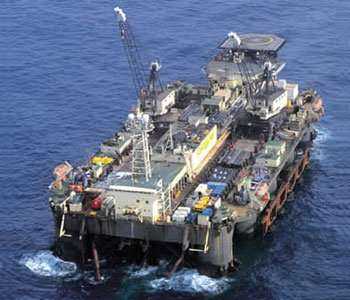EIA: Nord Stream
Nord Stream is a, or rather „the” gas pipeline that by the end of this year will connect Germany with Russia. The pipeline is being build offshore, thus avoiding the traditional and from an investment point of view rational land path. Because of its offshore positioning it has raised a lot of controversy, not only because of its potential environmental impact, but also because of its political and ethical aspects.
Nord Stream is owned by Nord Stream AG, a consortium that joins Gazprom (51% of shares), BASF, EON, Nederlandse

Nord Stream pipeline path
Gasunie and GDF Suez. The contract between Germany and Russia was signed in 2005 and the final agreement of companies was signed in 2006 in Moscow. The whole pipeline is going through the Baltic Sea and is crossing only Russian and German waters. The economic zones through, which the pipeline is passing belongs to Finland, Sweden and Denmark, which all gave their permission. It is going to be the longest sub-sea pipeline in the world having 1,222 km long and it is going to be completely finished by the end of 2012.
Of course the main concerns came from the four countries that have been “ignored” during the construction (Estonia, Latvia, Lithuania and Poland). The whole project will cost €8.8 billion, while the onshore version would cost only €5 billion. It was explained that in long term it would be more profitable, because of the elimination of transit fees. For instance Ukraine alone will lose $720 million per year. It is also believed that Russia wanted to make a direct contact with Western Europe in order to have a higher influence on countries like Belarus, Ukraine or the Baltic Republics. It is highly influencing the energy security of those countries, as they may not have the support of the Western European countries (remember the Russian gas embargo on Ukraine in 2008).

A special unit used to lie the pipeline.
As far as the potential environmental impact on the Baltic Sea is concerned the official Nord Stream website is confirming that each country, through out which the pipeline is passing have carried out an EIA with positive results. In reality there are two serious environmental concerns. The first one is obvious and is regarding the construction process. It is necessary to dig an excavation 15 m wide. It will have an impact on the fauna and flora and also on the biodiversity of the Baltic Sea ecosystem. It will fragmentize some habitats that are living on the rocks of the bottom of the sea. The other main concern is the fact that the sea bed was disturbed during the II World War with naval mines, chemical waste, munitions and toxins, and other items. Thereby those toxic substances may harm the particularly sensitive Baltic Sea ecosystem. Some of the mines where found by Nord Stream and were detonated under water.
Some ethical controversies were also raised along the project development. The former German Chancellor Gerhard Schroder signed the agreement with Russia few weeks before he stepped down offering €1 billion of guarantee. Even though the guarantee was never used, Schroder was chosen to be head of shareholder committee of Nord Stream AG. Same thing happend with the former Finnish prime minister Paavo Lipponen, who also worked for Nord Stream AG after accepting its way through the Finnish economic zone.
References:
- Nord Stream AG Official website – http://www.nord-stream.com/environment/
- “Wartime Mines to Be Cleared from Nord Stream Route” – http://www.downstreamtoday.com/news/article.aspx?a_id=13974&AspxAutoDetectCookieSupport=1
- “Nord Stream costs Ukraine $720 million” –http://www.upi.com/Business_News/Energy-Resources/2011/05/20/Nord-Stream-costs-Ukraine-720-million/UPI-83611305917575/
- “Nie chodzi tu o rentowność” – http://www.naszdziennik.pl/index.php?typ=sw&dat=20090210&id=sw24.txt




.png)
].gif)
.png)
].png)
].png)
].png)
.png)
].png)
.png)
